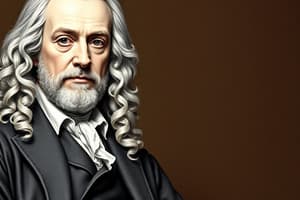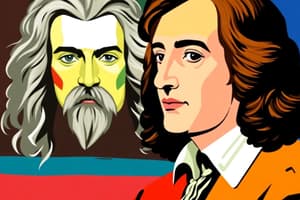Podcast
Questions and Answers
When was Locke born?
When was Locke born?
August 29, 1632
When did Locke die?
When did Locke die?
October 28, 1704
Cite two or three important facts about Locke's Two Treatises of Government.
Cite two or three important facts about Locke's Two Treatises of Government.
It defends individual political liberty, was influential in revolutions, and was published anonymously in his lifetime.
Define legitimate political power, according to Locke.
Define legitimate political power, according to Locke.
How does Locke's Second Treatise of Government begin?
How does Locke's Second Treatise of Government begin?
What are the key features of what Locke calls the state of nature?
What are the key features of what Locke calls the state of nature?
What is the law of nature, according to Locke?
What is the law of nature, according to Locke?
According to Locke, how do human beings come to understand the law of nature?
According to Locke, how do human beings come to understand the law of nature?
What is the connection between human equality and human rights?
What is the connection between human equality and human rights?
Describe all of the rights possessed by people under the law of nature.
Describe all of the rights possessed by people under the law of nature.
What justifies punishment, according to Locke?
What justifies punishment, according to Locke?
Describe the state of war.
Describe the state of war.
How much force may a person use to stop a thief in the commission of his crime?
How much force may a person use to stop a thief in the commission of his crime?
To what extent may individuals punish other individuals in the state of nature?
To what extent may individuals punish other individuals in the state of nature?
How does Locke describe and defend the right to self-defense?
How does Locke describe and defend the right to self-defense?
How does Locke define slavery?
How does Locke define slavery?
Does Locke think that there are circumstances that justify slavery?
Does Locke think that there are circumstances that justify slavery?
What are some of the main difficulties with people acting as individual executioners of natural law?
What are some of the main difficulties with people acting as individual executioners of natural law?
What does Locke mean by 'property'?
What does Locke mean by 'property'?
Explain the difficulty Locke faces in justifying the possession of individual private property in the state of nature.
Explain the difficulty Locke faces in justifying the possession of individual private property in the state of nature.
Explain how Locke does justify individual possession of private property.
Explain how Locke does justify individual possession of private property.
Are there any limits on the acquisition of private property in the state of nature?
Are there any limits on the acquisition of private property in the state of nature?
What does Locke think about inheritance of private property?
What does Locke think about inheritance of private property?
How does Locke explain the invention of money?
How does Locke explain the invention of money?
How, according to Locke, is the exchange value of money determined?
How, according to Locke, is the exchange value of money determined?
Why is money an important factor in the transition from the state of nature into civil society?
Why is money an important factor in the transition from the state of nature into civil society?
How does Locke explain the development of organized, civil society?
How does Locke explain the development of organized, civil society?
Do individuals have to give up any of their equal rights when they enter civil society?
Do individuals have to give up any of their equal rights when they enter civil society?
What is the rational foundation for civil government?
What is the rational foundation for civil government?
How does Locke explain the transfer of the right to legislate and enforce law from individuals to civil government?
How does Locke explain the transfer of the right to legislate and enforce law from individuals to civil government?
What does Locke see as the sole purpose of government?
What does Locke see as the sole purpose of government?
How would Locke describe the duties of government?
How would Locke describe the duties of government?
What is Locke's argument that an absolute monarchy could never be a legitimate form of civil government?
What is Locke's argument that an absolute monarchy could never be a legitimate form of civil government?
Explain, in detail, how power is distributed in Locke's liberal civil society.
Explain, in detail, how power is distributed in Locke's liberal civil society.
Who holds supreme power?
Who holds supreme power?
Who is sovereign?
Who is sovereign?
What is the job of the legislature?
What is the job of the legislature?
How is the legislature selected?
How is the legislature selected?
What is the job of the executive?
What is the job of the executive?
What does Locke mean by 'the federative'?
What does Locke mean by 'the federative'?
Under what general circumstance do the sovereign people have a right to remove or alter the legislative?
Under what general circumstance do the sovereign people have a right to remove or alter the legislative?
When is the legislative power of the government subordinate to the executive power?
When is the legislative power of the government subordinate to the executive power?
Which branch of government has the power of assembling and dismissing the legislative branch?
Which branch of government has the power of assembling and dismissing the legislative branch?
Is this power supreme, making the legislative branch subordinate?
Is this power supreme, making the legislative branch subordinate?
What would be the situation in a civil society where the executive power of the government hinders the meeting and activity of the legislative power?
What would be the situation in a civil society where the executive power of the government hinders the meeting and activity of the legislative power?
Regarding conquest, how would Locke describe the position of an unjust aggressor, or invader?
Regarding conquest, how would Locke describe the position of an unjust aggressor, or invader?
In contrast, a just conqueror in a lawful war gains certain powers over others by his victory. What are those powers, and over whom?
In contrast, a just conqueror in a lawful war gains certain powers over others by his victory. What are those powers, and over whom?
Does Locke believe that monarchies are the only form of government that runs the risk of becoming tyrannical?
Does Locke believe that monarchies are the only form of government that runs the risk of becoming tyrannical?
What is the difference between dissolution from without, and dissolution from within?
What is the difference between dissolution from without, and dissolution from within?
What conditions place a government in a state of dissolution?
What conditions place a government in a state of dissolution?
What conditions place a government in a state of war with the people?
What conditions place a government in a state of war with the people?
What rights do the people have when their government is dissolved?
What rights do the people have when their government is dissolved?
What rights do the people have when their government places itself in a state of war with them?
What rights do the people have when their government places itself in a state of war with them?
Flashcards are hidden until you start studying
Study Notes
John Locke: Second Treatise of Government
- Born on August 29, 1632, and died on October 28, 1704.
- The Two Treatises of Government defends individual political liberty based on natural rights and law.
- Influential in revolutions, notably the Glorious Revolution of 1688; published anonymously during Locke's lifetime.
Legitimate Political Power
- Defined as the authority to make laws with associated penalties, preserving property and defending the commonwealth.
- Political power exists solely for the public good.
State of Nature
- Begins with a scenario where humans have freedom and equality, governed by natural law.
- All persons possess rationality and equal rights to execute natural law.
Law of Nature
- Prohibits harming others concerning life, health, liberty, or property.
- Understandable by reason, accessible to all individuals.
Human Rights and Equality
- Each individual has an equal right to enforce natural law and punish violators.
Rights Under Natural Law
- Encompass life, liberty, health, and private property.
Justification of Punishment
- Based on reparation (restoring the victim) and restraint (preventing further crimes).
State of War
- Occurs when one violates the law of nature, putting themselves in conflict with victims.
Self-Defense
- Justified destruction of those who pose a threat to life, health, liberty, and property is necessary under the law of nature.
Definition of Slavery
- Characterized by one person exerting absolute power over another.
- Only justifiable in the context of defeating a lawless aggressor.
Difficulties with Individual Enforcement
- Bias in the application of natural law due to personal interests leads to unequal punishment.
- Individuals often lack the authority to impose fair penalties.
Concept of Property
- Encompasses life, liberty, health, and possessions.
- Locke struggles with reconciling common ownership of resources with private property.
Justification of Private Property
- Based on personal labor mixed with common resources.
- Example: Cultivating land grants ownership to the laborer.
Limitations on Property Acquisition
- Individuals cannot deplete resources excessively or waste valuable materials.
Inheritance Rights
- Every individual has the right to inherit property and goods from family.
Invention of Money
- Solves issues related to perishability of goods, enabling wealth accumulation.
- Money needs to be a lasting medium accepted by mutual agreement.
Role of Money in Society
- Facilitates the development from a state of nature to civil society by enabling wealth concentration.
Civil Society Formation
- Inequality caused by money leads to disputes, prompting the need for governed society with laws to protect property.
Rights in Civil Society
- Individuals surrender their rights to execute natural law but retain other rights.
Foundation of Government
- Rooted in the protection of property.
Consent in Governance
- Power to legislate is transferred through mutual consent of equals, not hierarchical decree.
Purpose of Government
- To regulate laws protecting citizens’ property and well-being.
Government Duties
- Primarily focused on protecting the majority's property rights.
Critique of Absolute Monarchy
- Considered a form of illegitimate slavery due to lack of consent and arbitrary power.
Distribution of Power
- Legislative branch holds supreme power; executive and federative powers assist but do not dominate.
Sovereignty
- Resides with the people, who hold the ultimate authority in governance.
Legislative Powers
- Governed by laws that are non-arbitrary and intended for public good.
- Comprised of elected representatives and hereditary nobility.
Executive Role
- Responsible for law execution and legislative assembly coordination.
Situations of Government Dissolution
- External aggression or internal failures, such as abuse of power.
Citizens’ Rights Upon Government Dissolution
- Right to rebellion and disband political society when facing governmental oppression and misuse of power.
Summary
- Locke's perspectives on governance and individual rights underscore the contextual narrative of human liberty and the ethical basis for law and society.
Studying That Suits You
Use AI to generate personalized quizzes and flashcards to suit your learning preferences.




